D.R.E.A.M.W.E.A.P.O.N.S.
From ‘white boy horror’ to Oedipus Tyrannus, Timothy Morton addresses cultural phenomena that inform our moral choices in the face of the impending climate crisis. To save ourselves we must think collectively, at Earth magnitude. Could comedy be the answer?
Should young people read Aristotle? That is a question. ‘No, they shouldn’t’ would be a perfectly good answer. ‘Why shouldn’t they?’ is the sort of follow-up question many people might ask and the answer is: because Aristotle puts humans front and centre in his theory of poetics. For our purposes, however, this response is less to do with writing nice tragedies that don’t have too many wacky and improbable plot twists, and more about attuning oneself to human beings accurately enough to engage them in ways that will profoundly influence their behaviour.
But not having too many wacky and improbable plot twists is also part of this, because if there’s one thing Aristotle doesn’t like, it’s the use of the deus ex machina. In his day this was often a wooden TARDIS-like object that was wheeled out onto the stage, carrying some kind of powerful all-seeing godlike being, like a Greek Doctor Who, capable of cleaning up the mess after planet Earth has been heated to a Triassic Period level of intensity, for example. (This scenario is entirely on the cards, by the way, if we continue using fossil fuels, as God intended).
The point is, that if we keep on watching stuff like this, we will be tempted to sit back and engage even less than we do now. We might be slightly stimulated, and maybe compare this stimulation to the last deus ex machina we were exposed to in the last bad tragedy we watched. Standards are really slipping here at the City Dionysia in Athens, dudes! In fact, they were pretty low in the first place because tragedy was traditionally an agricultural society’s way of explaining itself to itself, version 2.0 (version 1.0 was religion).
Tragedies compare to the Catholic mass – you watch a priest, or in this case, a tragic hero, go through the motions so you don’t have to. It is literally hierarchical, because ‘hierarchy’ comes from the Greek word for priest. You’re alienated. There’s a fourth wall. Stuff is happening that you’re not allowed to do – so just sit back, relax and watch a professional do it for you. ‘It,’ in this case, is characters trying to extricate themselves from the web of fate, only to find that the process is weaving the web ever tighter. The attempt, for example, to avoid mild global warming in the early Holocene period around 10,000 BCE ends up with human beings creating much, much worse global warming twelve and a half thousand years later.
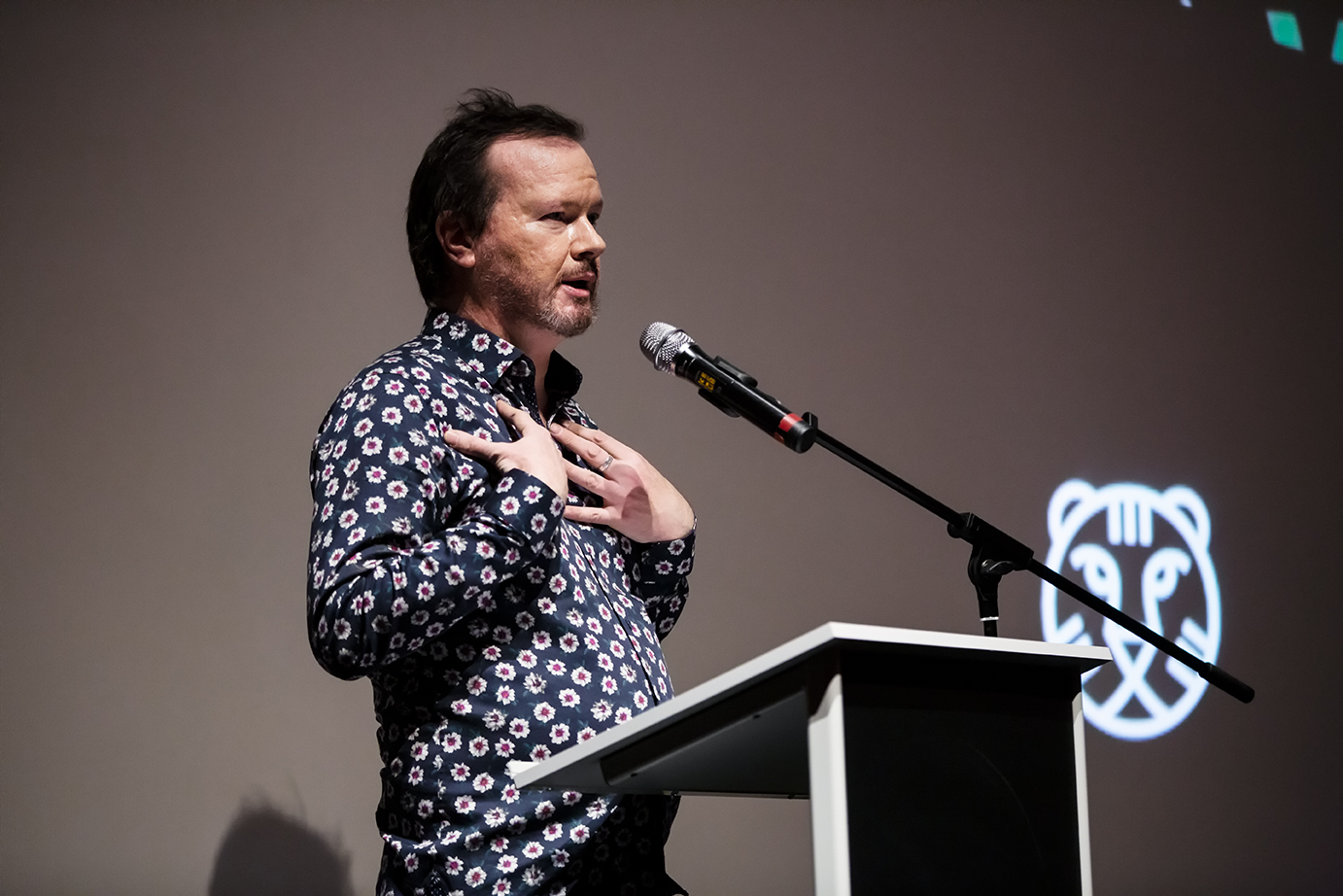
Timothy Morton delivering his D.R.E.A.M.W.E.A.P.O.N.S. speech at De Dépendance at the International Film Festival Rotterdam, 31 January 2020. Photo is courtesy of De Dépendance.
When you’ve seen a guy called Humankind, say, going through these ritual motions on stage like a priest, caught in this web of destiny so you don’t have to be, and you’re sitting in the audience, totally freaked with fear and pity, it’s a tragedy and it might be called Oedipus Tyrannus. Think catharsis, yay! Really glad it’s over! Now we can go home, but best put some more gas in the car first…
But when you see maybe eight different people doing it simultaneously it’s called Fawlty Towers. You’re rolling about laughing because you could be one of those people. The fourth wall got a bit shimmery for a moment. Weird, it was almost as if I was part of it.
I’ve always thought comedy was deeper than tragedy, and it seems to me that comedy is more than just about how a hierarchical, patriarchal and racist society explains itself to itself, and also more than religion or what calls itself philosophy. Here’s the philosopher Tim Morton who will mansplain everything someone else said so you can feel clever about it. That’s what we all think philosophy is, and the white boys who do it aren’t too keen on proving us wrong, are they? But we white boys are just beginning to look around nervously (or in my case sometimes bursting into tears and wanting to curl up in a foetal position). And this is because we’re just starting to experience a little bit of what everybody else on this planet has been going through on a daily basis, mostly because of us, even before global warming showed up on the radar.
Part of the white boy horror and amazement comes from realizing quite late in the game that we came out of vaginas, or if not, then out of something that wasn’t us – a test tube maybe, or perhaps some aliens put us into batteries to generate bioelectric energy, like in The Matrix. The point is, white boys didn’t come out of themselves, which is, embarrassingly and unbelievably, a horrible shock to them.
The fact is we came out of a biosphere, no matter whether that biosphere is incarnated as a specific this or a specific that, in any specific case. Shit! You mean this isn’t a theatre with stuff happening magically, out of nothing? You mean this cave we’re in goes on forever all around this globe, so that the very attempt to get outside of it is actually just the action of running around inside of it? Always? Well, blow me down!
The other thing about comedy is that it’s like a healthy ecosystem, a nice peaceful habitat where no one life form is crowding out the others. The clue lies in the word ‘comedy’, which has to do with feasting together. According to Aristotle, tragedy comes in two flavours: fear and pity. Maybe other forms of art limit you to just a couple of flavours as well, but comedy comes in lots of different flavours. In comedy, emotions can coexist without deleting one another. Hope, rage, hilarity, heartbreak, fear, ridiculous absurdity, sadness, warmth, wistful melancholia…ferns, coral, fungi, humans, polar bears, stomach bacteria, those little crustaceans that live in your eyelashes…
So another pertinent way of addressing the question ‘should young people read Aristotle?’ is to respond: ‘yes, they blinking well should’. He’s like a tedious uncle who reminds you that things should be both possible and probable. Possible, because there exist forces such as gravity and we don’t know yet how to harness them (no matter how persuasive Michael Caine sounds in Interstellar). I may want to be saved by a deus ex machina as much as anyone else, but what happens in plays, movies, novels or videogames should be possible, otherwise any ending can be as wacky as the idea of aliens whisking Jesus away while he’s being crucified. This may be funny when it’s a self-reflexive part of a film like The Life of Brian, but finishes up by being unsatisfying and boring and wrecking your ability to appreciate anything.
So none of that, says Aristotle. There should be no impossible stuff, if you want your art to be intense or if you’d like people to leave your show saying: ‘Jesus H Christ on a stick, this global warming thing is real! I can feel it coming in the air tonight, oh Lord, and I’m gonna never drive my truck ever again! Sorry honey but that’s just the way it’s gonna be from now on.’
Equally, the action should be probable. The protagonists should act in a way that you would expect them to. Take Interstellar again (it’s a movie that I love). While they’re slingshotting around the black hole, Matthew McConaughey doesn’t suddenly go: ‘Hey, why am I sacrificing myself and my best robot buddy to send my potential future wife on a blind date with some biologist she’s only met once and probably only had a crush on for like three weeks but now it’s really exaggerated in her mind because she’s in this other galaxy and she has this “we have to save the world” thing…Fuck this for a laugh, we’re all going in! Let’s disco!’
If it’s not probable in terms of what’s going on inside people, or possible, then anything can happen and the show loses its intensity. People leave going: ‘oh, what the hell! Let’s just get in the truck and drive around these amber waves of corn until all the gasoline is used up, or until planet death has occurred, whichever comes first’.
So, to give an alternative answer to the question ‘should young people read Aristotle?’ Yes, they should. And why should they? We’ve answered that in terms of the formal requirements of drama, but there’s another far bigger answer concerned with human beings. In fact, we started with this bigger answer when we were saying no and arguing that Aristotle isn’t so great because of his anthropocentrism – the way in which he makes human beings special and different in ways that are bound to destroy Earth (assuming his idea is executed with enough energy and belief, and ‘used properly’, as David Byrne says of nuclear weapons).
But we can put together another answer as well which is, weirdly, exactly the same. It is that Aristotle puts humans front and centre in his theory of poetics because dolphins (for example) don’t have fingers with which to hit the Return key and switch off oil pipes, because we understand global warming and we don’t know whether dolphins do, and even if they did, we are responsible, not only because we did it but simply because we understand it.
Of course, it’s quite possible jellyfish actually did it – and they’re going to be really plentiful in the warmed future so maybe this is their power move – but that doesn’t mean we aren’t responsible.
Even if we human beings are the equivalent of the asteroid that struck Earth and wiped out the dinosaurs, even if formally we are the ones who did it, the most important thing I can say to you now is: you are not guilty. You really aren’t. Guilt is scaled to individuals and individuals didn’t do it.
I came to America in the 1990s when (probably under the influence of oil corporations) hotels were displaying signs like: ‘Save the Earth! Put your towel back on the towel rack!’ But all that individually scaled stuff did not, does not and will not do anything. Even starting your internal combustion engine doesn’t really do anything, at least not at Earth magnitude. You are not guilty. Yet the paradox is that billions of keys, turning in billions of ignitions billions of times, do affect and increase global warming.
This disturbing paradox is a part of ecological awareness. Making people feel bad about themselves is really ineffective, as ineffective as making them feel amazing because they hung up a damp towel in a hotel shower in 1995. What does make a difference is you as a member of something called humankind, a huge, massively distributed entity that functions and looks in a way that’s wholly and weirdly different from its small-scale parts. The word I’ve created to express this idea is ‘hyperobject’.
But my lecture is entitled ‘Dreamweapons’. Why? It’s a riveting title – literally – with rivets between the capital letters, so the actual title is ‘D! R! E! A! M! W! E! A! P! O! N! S!’. I chose it because it seemed goofy and intense and genuinely important. Every letter is like a diamond bullet going through your forehead, or whatever it is Marlon Brando says when he’s playing Kurtz in Apocalypse Now. Because this is about how to rivet as many people as possible, to nail them to the thought that giving a monkey’s about global warming would be a really, really, good idea to have right now.
And there’s also the fact that rightwing Fox News aesthetic is so cornily riveting, the way those rotating metallic letters burst out of the screen in that mind-numbing but totally compelling way (I’m reminded of a gigantic turkey drumstick slathered in some kind of vermillion paste at an airshow I took my son to a few years ago). Those rightwing aesthetics people can’t have all the fun!
In school, when we studied art, there was one essay by Walter Benjamin we all had to read. It was entitled ‘The Work of Art in the Age of Mechanical Reproduction’ and it was compulsory. A lot of people think this essay suggests art is evil – which isn’t really either Marxist or Walter Benjamin, it’s just the default Platonic, nihilistic stupidity that’s part of the base code of the so-called civilization ruining the biosphere.
I live in the same street as the Rothko Chapel in Houston, which is not really an art gallery, and not really a chapel. It’s in between those categories. And I have an experiment going. Anyone who likes that essay by Walter Benjamin and stands by the idea that it’s saying art is evil and you should get rid of it as quickly as you can, wipe the dirt off the message (Benjamin calls it the aura) because art is the gateway drug that starts fascism – those people can’t stand to be in the Rothko Chapel for more than two minutes thirty seconds. Because in the Rothko Chapel, the impression is that art is coming out of the walls, it’s everywhere, and there’s that wet concrete petrichor brutalism smell combined with a weirdly persistent linseed oil smell coming off of the canvases. Help, go the Walter Benjamin enthusiasts, I’m covered in art! Get it off me, take me to the Cy Twombly, I can’t handle it! And at the back of their minds, they’re thinking, this work of art thing is really different from what they taught me in theory class, and I can’t get all cynical and smug and knowing about it. I’m drowning in art, it’s having an effect, and I didn’t ask for this! It makes a mockery of the active versus passive binary I’ve been retweeting like everyone else because, whether I like it or not, like I’m still on a mission from patriarchal Neoplatonic Christianity from the middle ages no matter what I think my politics are! And I’m not even a socialist!
Two minutes thirty seconds.
Benjamin made a bit of a mistake in that essay. Sorry, dude, but you did. He says at the end that fascism is the aestheticization of politics. But if you think about it, aesthetics and politics (as opposed to ethics and morality) are kind of the same, based on amoral sorts of decision like ‘let’s put a blob of yellow next to this blob of red’ or ‘let’s connect these two groups together’. Indeed, if you’re going to get deep about it, aesthetics and politics are basically the way the whole biosphere works, in a symbiotic way. It’s not particularly good or especially bad.
Consider a single-celled organism, blobbing through the ocean. Glop! ‘Oh my god,’ goes the organism, ‘did I just swallow poison?’ This is what we call the phenomenology of symbiosis. The association between beings always has this uneasy quality to it, and you delete it at your and others’ peril. Say, for example, you want to be totally sure who comes through your border… Need I go on? The thing about porous walls, and they’re all porous to some extent, is that you can never be totally sure. Nor should you be. That is what basic hospitality means. It contains the threat of hostility nestled within it. Knock knock – who’s there? It might be Godzilla.
Tens of millions of years on, the single-celled organism’s descendants are going: ‘No, you didn’t swallow poison! That was an anaerobic bacterium, and now it’s an energy cell, and now I’m an animal! Yay evolution!’ There’s no way to make any sense of evolution if you look forwards – it isn’t going forwards because it doesn’t have a telos. It is non-teleological, with no ultimate object or aim. It only makes sense in retrospect.
Think of those nature documentaries where the voice-over talks about ‘the webbed feet of the duck, perfectly adapted to swimming in ponds’. Well, have you ever seen a coot? They also swim in ponds but they don’t have webbed feet. Which leads us to the conclusion that evolution doesn’t give a toss about webbed feet or adaptation. ‘Survival of the fittest’ means only that you had kids before you died. Pressure from social Darwinists, especially Alfred Russel Wallace and a Christian socialist named Herbert Spencer, persuaded Darwin to include the phrase, well after On the Origin of Species was first published. They couldn’t handle the randomness, the contingency. Much in the way some people can’t stand the Rothko Chapel for more than two minutes thirty seconds.
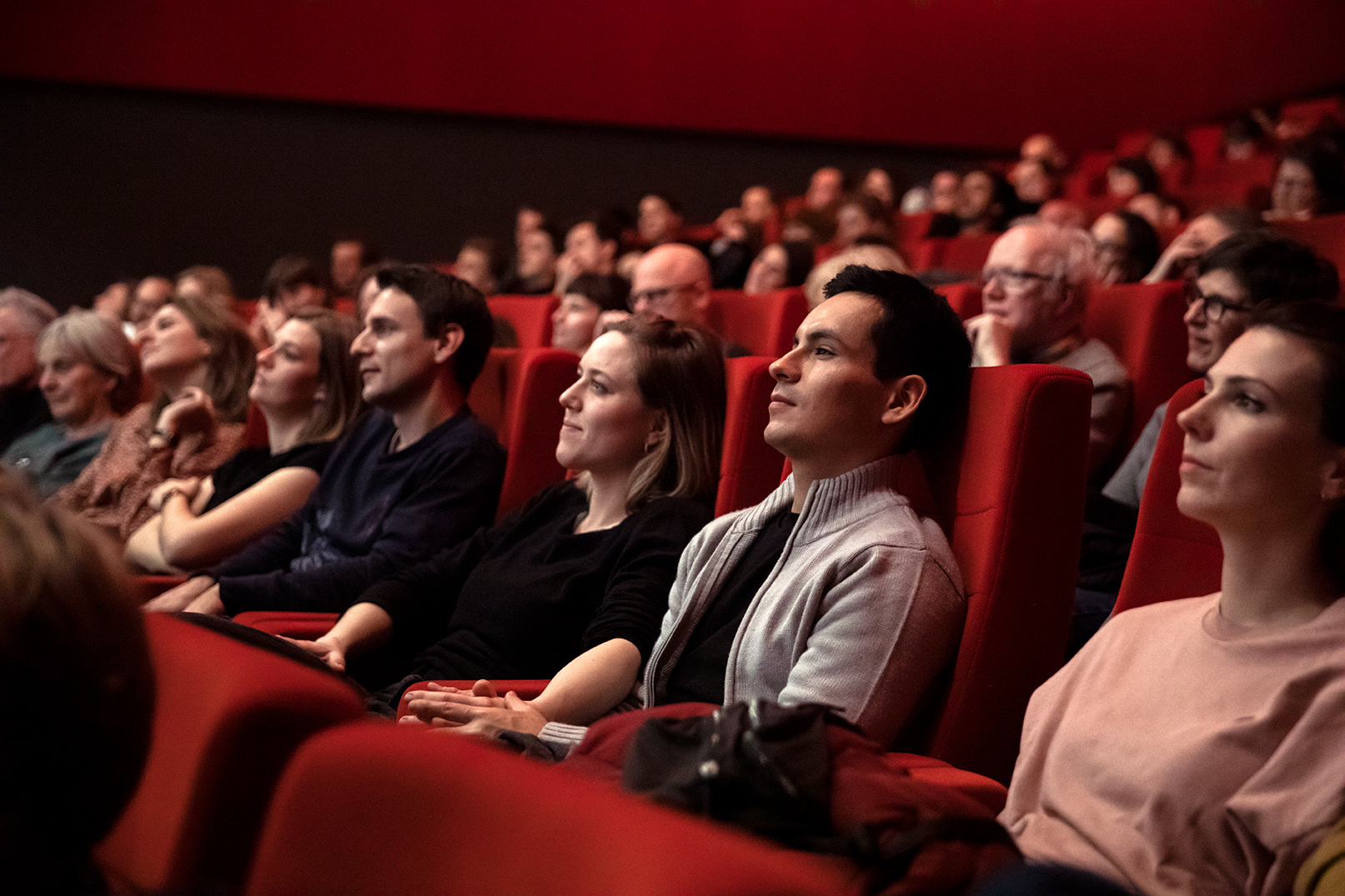
Audience memebers at Timothy Morton’s D.R.E.A.M.W.E.A.P.O.N.S. speech at De Dépendance at the International Film Festival Rotterdam. Photo courtesy of De Dépendance.
Or consider sexual display. I was in a film where someone said it was to attract members of the opposite sex. I tried and tried to get that line deleted because it’s so homophobic and biologically inaccurate. Can you see gay people? Good. Sexual display isn’t about attracting members of the so-called opposite sex. Think about the first beetle who had an iridescent wing case. The other beetles may have turned really beetlist and excluded it from their company as a mutant. Now ponder the first beetle who found that beetle attractive. The other ones are going wow, gross, there’s no accounting for taste! And that’s just it. There is no accounting for taste. It’s contingency, randomness. It’s what’s for dinner. It’s why things can be different. It’s why there is a future, no matter how far we try to automate the past and build it out, like that cartoon character, Wyle E Coyote, nailing a platform over the void, until he realizes he’s standing on nothing while doing the hammering.
So all that happens in the evolution space, the art space, the political space, has a contingent, open quality about it until someone interprets what is happening. The fascism doesn’t lie in turning politics into a work of art. It’s about assuming that it needs to be there in the first place. Make the politics great again. Make it feel great. Great is a feeling, isn’t it? It’s not just about might and power. It’s about pain relief. It’s an analgesic, like Vicodin. Relax, take another Vicodin, this is gonna be great, I’ll make you feel terrific by getting rid of those people over there.
Fascism believes that any other politics out there is a drab, featureless lump that needs to be blinged up. But as I’ve just argued, it’s bling all the way down. That’s also Benjamin’s problem. He thinks aesthetics is a thing that happens to stuff. But what I’m saying here (along with Darwinism, actually) is that aesthetics actually is the stuff, all the way down. So, all you progressive film and TV people, let’s act like this is true! Enough of only criticizing and critiquing and being cynical and bemoaning hypocrisy. You have to make some amazing, compelling, magnetic dream weapons that will get the Vicodin people to put down their turkey drumsticks and gaze slack-jawed in amazement as Fox gets aesthetically owned.
My daughter Claire recently got into Pre-Raphaelite art, because it’s basically saying, the trouble with capitalism and consumerism isn’t that it promises too much pleasure. It’s that it promises nowhere near enough. This fits in well with leftwing theories of labour, the Marxist one, for example, because for Marx production doesn’t mean being a robot in a Kraftwerk video, it means the pleasure of biting into a peach. I can point to the exact passage.
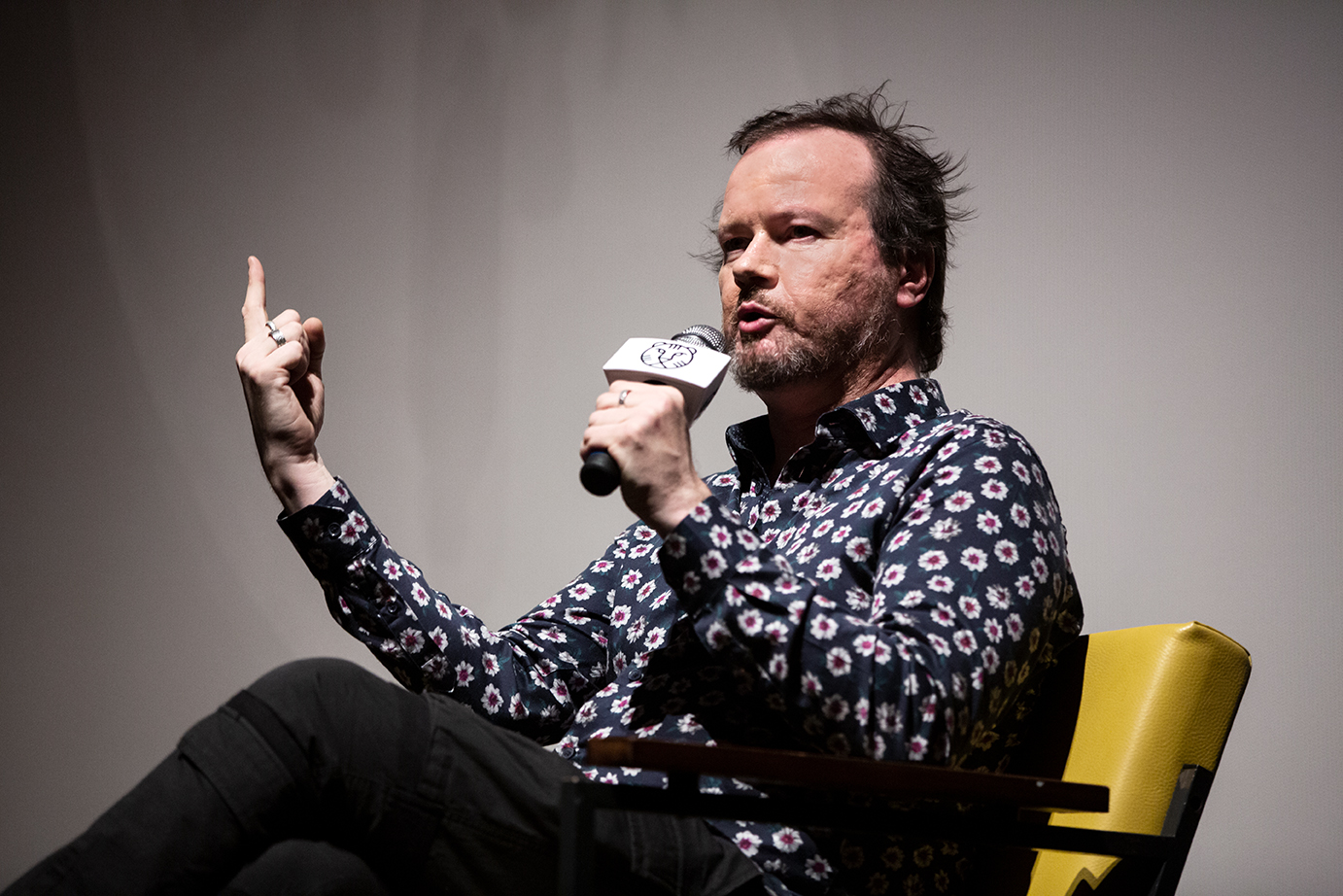
Timothy Morton delivering his D.R.E.A.M.W.E.A.P.O.N.S. speech at De Dépendance at the International Film Festival Rotterdam, 31 January 2020.
Producing and consuming, active and passive, are not as different as medieval Neoplatonic tweets would have you imagine. Maybe incremental change and sudden revolution aren’t opposites at all, or not entirely. Maybe that’s what they want you to think. Maybe action is made out of little dots of appreciation. Think of being in a band. You’re listening to the music, you’re listening to the other musicians, you’re attending to your musical lineage, to your instrument, to the audience, to the vibe in the room…
Surely increased pleasure could mean enjoying other beings’ pleasures, at least a bit. We shouldn’t be about just tolerating the other’s enjoyment, but about appreciating it. So the increase in pleasure must lead to an increase in ecological niceness. You can’t really enjoy something once you know how much fossil fuel it has burned. Being alive must be nice for polar bears, and we can make it be nice for us. Surely we can enjoy that so-called ‘crass’ pleasure that Dickens and others found so disturbing about Pre-Raphaelite art: putting a dot of amazing indigo paint right there on Ophelia’s dress, and some viridian green on a leaf in a one million dpi JPEG kind of a painting that doesn’t make a distinction between foreground and background, human subject or non-human surroundings. It’s the kind of pleasure that makes something awesome, so you can taste it.
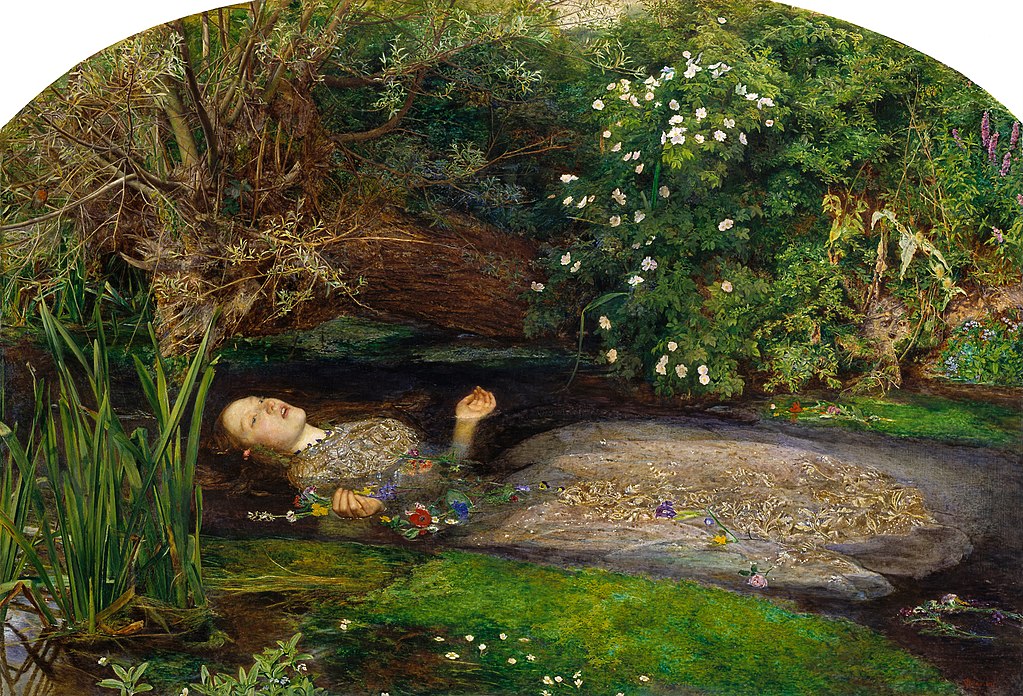
John Everett Millais: Ophelia (oil on canvas, ca. 1851). Image via the Google Art Project.
Even logic is kind of PR bling, I’d say. Even maths is. Mathematicians would be the first to agree with me – beautiful equations are a thing. That whole answer was in the question stuff is ‘truthfeel’. Beauty is truthfeel, as John Keats said, or more exactly: ‘Beauty is truth, truth beauty, that is all/ Ye know on earth…’.
Meanwhile, there’s data harvesting. Wipings are harvested, aggregated and weaponized to make black people not vote in Jamaica. There’s that William Blake style painting called The Ghost of Trump walking through his own combover, gazing into a bowlful of blood and going ‘so drenched, so drenched in blood’. Come on guys we can do better than this! We can improve on all this recycling – which is the trouble with automation.
It’s not AI that’s the problem, it’s the fact that automation causes the past to eat the future. Are we completely enlightened Buddhas living in a pure land of total bliss? No. So if the past sucked, let’s try for the future instead.
Progressive art isn’t just pointing at how things can be different, it is how things can be different. It’s a dimensional gate into utopia. We may not quite know how to fly the Falcon of increased pleasure through it right now – but I’m thinking that nowadays the gate has a strong Afrofuturist feel to it and that struggling against racism would be a very fast way to get to the polar bears more quickly. David Attenborough, if you’re listening, stop pointing at them and point to yourself for a moment! Do what you did to plastic, only to the idea of whiteness.
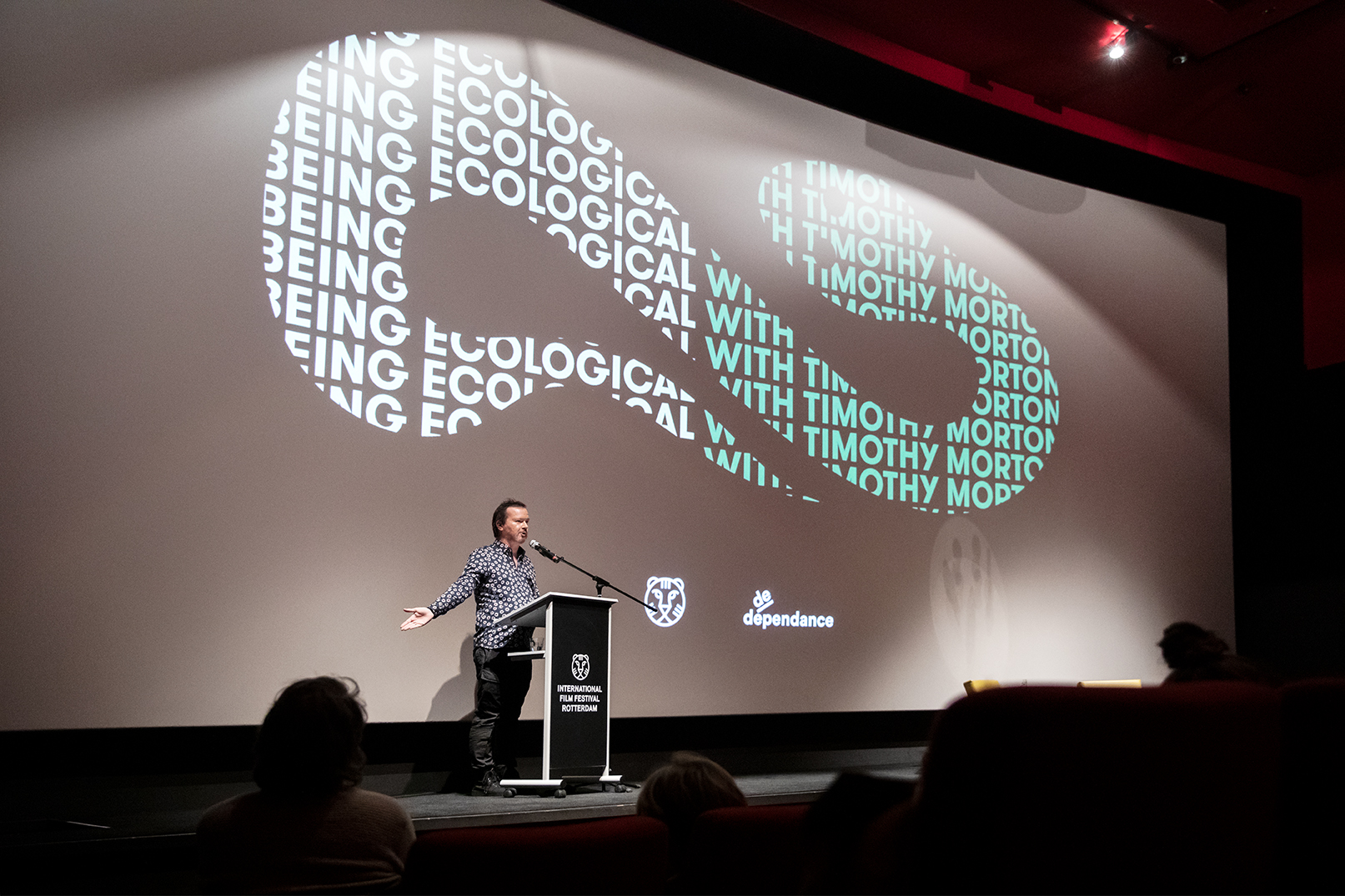
Timothy Morton delivering his D.R.E.A.M.W.O.R.K.S. speech at De Dépendance at the International Film Festival Rotterdam, 31 January 2020.
Let’s go back to thinking about tragedy being a kind of alienation, similar to watching a priest go through ritual motions so you don’t have to. All that religion and tragedy and mansplaining philosophy is a function of a hierarchical social structures that generated patriarchy, racism and class division. Yet still, the Mickey Mouse brooms of the agricultural society algorithm keep on sweeping away, for twelve and a half thousand years, and we’re still rubbernecking the show. It’s an alienation process.
Alienation from what? From our powers as a gigantic collective being that hasn’t had a chance to realize that it is a gigantic collective being yet. Alienation from the superpowers of a hyperobject called all the human beings on this planet, doing it right for the biosphere. Consider the Marshall Islands and nuclear testing. You don’t need to do this, American people! We even imagine humankind as an alienated thing, a single vast metallic being that is the same all the way through. Scratch anyone, and a white or transparent (same thing) man is revealed underneath. We have to get out of this gaping mode in which we look for the spectacular and see human beings as a unified tragic Godzilla. Godzilla wants us to do something. But look, it’s out there, it’s being Godzilla so we don’t have to. That’s the point of Godzilla.
Godzilla says, no massive geoengineering, no terrifying deus ex machina spectacles fixed by technocratic billionaires. Godzilla says, make democracy feel as lovely as it could. Foment it. We are part of a loose, vague, inconsistent and diverse, yet real, hyperobject called humankind. Let us think about collective action at Earth magnitude. My son Simon has imagined a sitcom where Godzilla is a regular, ordinary person. The character comes in and sits down on the sofa with the other Earth defenders and they watch TV – in much the same position as the television audiences on their sofas. But they’re watching shows about humans destroying Earth.
It’s significant that, as global warming awareness has increased, so has the size of Godzilla, who is the sum total of everything wrong done to Japan and the Pacific by America, the bits of ourselves we don’t want to see. The environmental bits. Please note though, that pleasure in eco mode is inevitably going to have a gross fringe to it, because, remember, ‘yuck, was that poison I just swallowed?’ is the basic format of symbiosis.
Toys ‘R’ Us and so is Godzilla. Sitting in your living room, Godzilla is that hyperobject, rather than an objectified spectacle you’re watching, or just another way to retweet the grief, shock and panic we’re feeling. On its birthday, all Godzilla’s friends wish it a happy 66th and it goes ‘thank you for reminding me of my mortality once a year’. Please, how do we get out of tragedy space and into comedy space?
It’s a political question.
This essay is based on the lecture the author gave at De Dépendance for the International Film Festival Rotterdam, 31 January 2020.
Published 26 March 2020
Original in English
First published by Eurozine
© Timothy Morton / Eurozine
PDF/PRINTIn collaboration with
In focal points
Newsletter
Subscribe to know what’s worth thinking about.
Related Articles

The white saviour, driven by a moral mission, benefits from the oppression they claim to resist. Reactions to the plight of ‘victims’ often fail to translate into concrete actions, leaving those in need of care begging for sympathy. Could acknowledgement of individual complexity to the point of mystery alter this dynamic?

The conglomerate publishing industry sets conservative parameters on what it considers will sell. Repeating a winning ‘trending’ formula is high up on its list. But blobby, multi-coloured book covers lining supermarket shelves aren’t the only result of industry homogenization – independent presses are negotiating gaps in the market, spearheading literary excellence.






